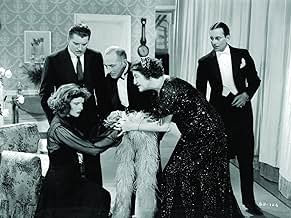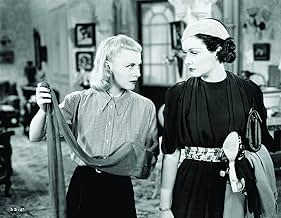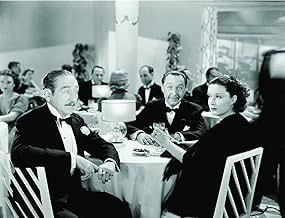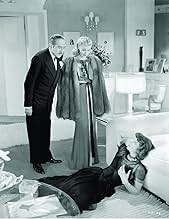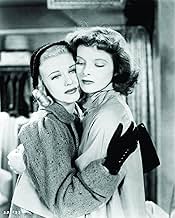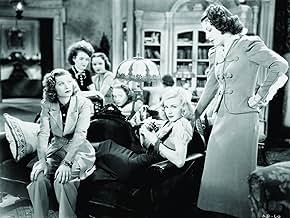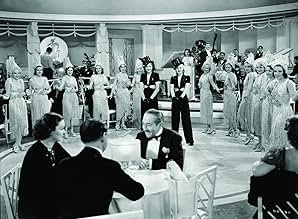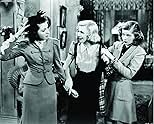IMDb RATING
7.7/10
9.6K
YOUR RATING
A chronicle of the ambitions, dreams, and disappointments of aspiring actresses who all live in the same boarding house.A chronicle of the ambitions, dreams, and disappointments of aspiring actresses who all live in the same boarding house.A chronicle of the ambitions, dreams, and disappointments of aspiring actresses who all live in the same boarding house.
- Nominated for 4 Oscars
- 5 wins & 5 nominations total
Featured reviews
Director Gregory LaCava apparently liked to hit the bottle and so had a spotty career, but Stage Door is his masterpiece. Not in some personal, auteurist way, but in having achieved an almost ideal example of Depression-era movie entertainment. Its venue is the Footlights Club, a theatrical boarding house near Broadway, where lamb stew and broken dreams are the nightly staples. Among the gals with stiletto tongues but hearts of gold are Lucille Ball, Eve Arden, Ann Miller, Gail Patrick and formidable Constance Collier ("Could you see an older woman in the part?"). But the movie centers on the rivalry between roommates Katherine Hepburn, as a spoiled rich kid who tries acting as a lark, and Ginger Rogers, as a plucky thespian waiting for her break. Believe it or no, those diametrical opposites (aristocratic, ethereal Kate and tough, pragmatic Ginger) work like a dream together. The script negotiates a delicate path between pathos and bathos, and somehow keeps its balance, even when one of the troupers loses her grip on reality and...Well, enough said. Best of all: this is the movie in which Hepburn gets to elocute: "The calla lilies are in bloom again...." Sheerest heaven.
Katharine Hepburn takes up residence in a theatrical rooming house in "Stage Door," one of the great examples of ensemble acting in film.
Besides Hepburn, the film features Adolph Menjou, Lucille Ball, Ann Miller, Ginger Rogers, Andrea Leeds, Eve Arden, Constance Collier, and Gail Patrick.
Hepburn is a the daughter of a wealthy man who comes to New York to try her hand at acting. She talks a good game, but as we soon learn, she has no emotional understanding or connection to acting at all, approaching everything intellectually.
All of the women are pursuing careers in theater, some with more success than others, and Patrick has a sugar daddy (Menjou). Leeds is the tragic character, a star from the previous season who can't find work but is desperate for the lead in "Enchanted April."
The atmosphere created by director Gregory Lacava perfectly evokes the lively atmosphere of young women living together, sitting in the parlor complaining about food, men, and work or lack of it, as they sing, joke, play piano, strum the ukulele, and talk on the phone - all at once.
The acting is uniformly excellent, with each actress creating a unique character. Lucille Ball gives evidence of the comic timing that would make her one of the greatest TV stars of all time, and there are plenty of ironic one-liners to be had from Eve Arden, and Ginger Rogers matches her in sarcasm.
Ann Miller was supposedly 14 when she made this film; it doesn't seem possible but that was her story and she stuck to it. We do get to see a little bit of her tapping.
Andrea Leeds, bearing such a strong resemblance to Olivia DeHavilland, gives a touching performance as the doomed Kay, who does not have the emotional stability to withstand what can be a devastating career.
It's an extremely melodramatic role and rather than have her play against this, LaCava had her play to it, thus dating what could have stood as a compelling performance even today.
The climactic scenes toward the end are pure '30s, stripping the film of previous lightness and going into tragedy but are effective and real tear-jerkers. By the film's end, though, we've come full circle.
The film is based on the play of the same name which is actually quite different. The whole idea was probably based on the Studio Club in New York City. "Stage Door" is wonderful and the script, acting and direction make it a deeply satisfying experience.
Besides Hepburn, the film features Adolph Menjou, Lucille Ball, Ann Miller, Ginger Rogers, Andrea Leeds, Eve Arden, Constance Collier, and Gail Patrick.
Hepburn is a the daughter of a wealthy man who comes to New York to try her hand at acting. She talks a good game, but as we soon learn, she has no emotional understanding or connection to acting at all, approaching everything intellectually.
All of the women are pursuing careers in theater, some with more success than others, and Patrick has a sugar daddy (Menjou). Leeds is the tragic character, a star from the previous season who can't find work but is desperate for the lead in "Enchanted April."
The atmosphere created by director Gregory Lacava perfectly evokes the lively atmosphere of young women living together, sitting in the parlor complaining about food, men, and work or lack of it, as they sing, joke, play piano, strum the ukulele, and talk on the phone - all at once.
The acting is uniformly excellent, with each actress creating a unique character. Lucille Ball gives evidence of the comic timing that would make her one of the greatest TV stars of all time, and there are plenty of ironic one-liners to be had from Eve Arden, and Ginger Rogers matches her in sarcasm.
Ann Miller was supposedly 14 when she made this film; it doesn't seem possible but that was her story and she stuck to it. We do get to see a little bit of her tapping.
Andrea Leeds, bearing such a strong resemblance to Olivia DeHavilland, gives a touching performance as the doomed Kay, who does not have the emotional stability to withstand what can be a devastating career.
It's an extremely melodramatic role and rather than have her play against this, LaCava had her play to it, thus dating what could have stood as a compelling performance even today.
The climactic scenes toward the end are pure '30s, stripping the film of previous lightness and going into tragedy but are effective and real tear-jerkers. By the film's end, though, we've come full circle.
The film is based on the play of the same name which is actually quite different. The whole idea was probably based on the Studio Club in New York City. "Stage Door" is wonderful and the script, acting and direction make it a deeply satisfying experience.
New York City. The Footlights Club is a theatrical boarding house where young women wait for the chance to make it big on Broadway. To deal with the disappointment & bitterness that can set in, they engage in wisecracks & gossip. Fiercely loyal to their friends, they can be wickedly spiteful to those that cross them. Always before them is their dream - to capture elusive success at the STAGE DOOR.
A wonderful film, fresh & sparkling, with great dialogue infusing its wit & drama. The rapid-fire cross talk is still a real treat for viewers - as is the chance to see several fine young actresses early in their careers.
The entire cast is excellent. Brash Katharine Hepburn is the new girl who quickly meets the `regulars': feisty Ginger Rogers, cynical Lucille Ball, wisecracker Eve Arden, lively Ann Miller, snobbish Gail Patrick & sweet Andrea Leeds. While the young ladies certainly get most of the attention, be sure not to overlook Constance Collier, terrific as Miss Luther the has-been actress. Growing old on bittersweet memories, she is a constant reminder to the others what, even with success, they still might become.
Adolphe Menjou gives his usual vivid performance as an immoral producer, while Samuel S. Hinds is good as Hepburn's father. Film mavens will enjoy spotting several familiar faces in uncredited roles: Jack Carson as a Seattle lumberman; Grady Sutton as a butcher's helper; Frank Reicher as a stage director; Franklin Pangborn, hilarious as a butler; and Ralph Forbes in the role of Hepburn's stage spouse.
A wonderful film, fresh & sparkling, with great dialogue infusing its wit & drama. The rapid-fire cross talk is still a real treat for viewers - as is the chance to see several fine young actresses early in their careers.
The entire cast is excellent. Brash Katharine Hepburn is the new girl who quickly meets the `regulars': feisty Ginger Rogers, cynical Lucille Ball, wisecracker Eve Arden, lively Ann Miller, snobbish Gail Patrick & sweet Andrea Leeds. While the young ladies certainly get most of the attention, be sure not to overlook Constance Collier, terrific as Miss Luther the has-been actress. Growing old on bittersweet memories, she is a constant reminder to the others what, even with success, they still might become.
Adolphe Menjou gives his usual vivid performance as an immoral producer, while Samuel S. Hinds is good as Hepburn's father. Film mavens will enjoy spotting several familiar faces in uncredited roles: Jack Carson as a Seattle lumberman; Grady Sutton as a butcher's helper; Frank Reicher as a stage director; Franklin Pangborn, hilarious as a butler; and Ralph Forbes in the role of Hepburn's stage spouse.
10zetes
I don't quite know how to put my passion for this film into words. It's something I never expected. I taped it off of television because I've been on a Ginger Rogers kick lately (I think I'm in love with her), and very luckily experienced something of enormous quality.
There is not a regular plot. Unlike most classical cinema, the goal towards which the film is striving is quite tenuous. Basically, the goal is for Katherine Hepburn to get a part in a play and give a good performance, but it is never stressed. Instead, what we get is more of an ensemble piece. There are characters who are more central than others, but we get to know well a great number of characters. And we live with them, experience their dreams, hardships, and successes, falling more and more deeply in love with them every minute, caring about them as we would dear friends or siblings.
It is most often referred to as a comedy, and the dialogue tends to be hilarious (Ginger Rogers is in full form here, wisecracking at the speed of light), but the film's drama is very affecting, too. This film's ending is so beautiful, and like all great films, we're reluctant to say goodbye to the characters. Fortunately, since I have it on tape, I can visit the boarding house any time I want. Unfortunately, since this film is neither on VHS nor DVD, you probably cannot. Watch for it on AMC or TCM or other stations that play classic films. You will not be disappointed. 10/10
There is not a regular plot. Unlike most classical cinema, the goal towards which the film is striving is quite tenuous. Basically, the goal is for Katherine Hepburn to get a part in a play and give a good performance, but it is never stressed. Instead, what we get is more of an ensemble piece. There are characters who are more central than others, but we get to know well a great number of characters. And we live with them, experience their dreams, hardships, and successes, falling more and more deeply in love with them every minute, caring about them as we would dear friends or siblings.
It is most often referred to as a comedy, and the dialogue tends to be hilarious (Ginger Rogers is in full form here, wisecracking at the speed of light), but the film's drama is very affecting, too. This film's ending is so beautiful, and like all great films, we're reluctant to say goodbye to the characters. Fortunately, since I have it on tape, I can visit the boarding house any time I want. Unfortunately, since this film is neither on VHS nor DVD, you probably cannot. Watch for it on AMC or TCM or other stations that play classic films. You will not be disappointed. 10/10
8sol-
A very well acted classic drama with great characters that interact realistically when together, it is also supported by some fine acting. Katharine Hepburn is very strong and natural, and Ginger Rogers matches her, playing a witty and almost cynical character very well. Gail Patrick is great too, yet Andrea Leeds was the only cast member to go on to receive an Academy Award nomination, however she is the best of the bunch, giving life to a frail and emotionally unstable aspiring actress. It is a bit overly talkative, and it has at least one too many subplots going on, however the film presents such an interesting insight into the lives of wannabee actresses that these points hardly matter. It is indeed a little difficult to distinguish each of the supporting characters as individuals, and perhaps they could done with further development, but yet this factor is very much like how all the aspiring actresses in the world are: indistinguishable, until you get to know them - and how actresses get ahead in the world is a lot of what this film is about. The final few minutes of the film could have been chopped out; otherwise this is good viewing all the way through.
Did you know
- TriviaWhen Katharine Hepburn delivered her climactic stage speech, Gregory La Cava reduced it to only ten lines and filmed it on a closed set. He later brought in the actors and the extras in the audience and had them react to the filmed speech. Many of them broke down.
- GoofsThe band at Club Grotto, where Jean and Annie perform a dance number, includes a female vocalist who can be seen singing in the background, but no vocals are heard on the soundtrack.
- Quotes
Terry Randall: [delivering her opening speech in the play within the movie] The calla lilies are in bloom again. Such a strange flower, suitable to any occasion. I carried them on my wedding day and now I place them here in memory of something that has died.
- Alternate versionsSPOILER: A shot of a man mowing the grass around Kay's grave is missing from some versions.
- ConnectionsEdited into Starring Katharine Hepburn (1981)
- SoundtracksPut Your Heart Into Your Feet and Dance
(uncredited)
Written by Hal Borne and Mort Greene
Danced by Ginger Rogers and Ann Miller
- How long is Stage Door?Powered by Alexa
Details
Box office
- Budget
- $952,000 (estimated)
- Gross worldwide
- $8,835
- Runtime
- 1h 32m(92 min)
- Color
- Aspect ratio
- 1.37 : 1
Contribute to this page
Suggest an edit or add missing content


